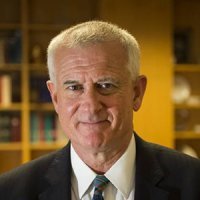Malcolm Gillies

Malcolm Gillies is a Canberra-based musicologist, and former music and opera critic of The Australian. Since 1997 he has edited the Studies in Musical Genesis series of Oxford University Press (New York).
Andrew Ford is a musical polymath. On his website he identifies as a ‘composer, writer and broadcaster’. I suspect the Australian public knows him best as a broadcaster, given his three decades at the helm of the ABC’s Music Show. That broadcasting longevity does not diminish his continuing acclaim as a composer, as seen in the rousing première of his Red Dirt Hymns before a capacity Canber ... (read more)
Despite what it packs into barely an hour, Gustav Mahler’s Das Lied von der Erde (hereafter, Erde) is insufficiently long to fill a subscription concert. Hence, the Australian Chamber Orchestra’s brief first half, which featured two suitably complementary works.
Wagner’s Siegfried Idyll originated as a birthday gift to his wife Cosima on 25 December 1870, honouring their infant son, Siegfri ... (read more)
Louise Berta Mosson Dyer (née Smith; later Hanson-Dyer; hereafter, Louise) lived several lives. An eccentric Melbourne socialite, married into the money of Linoleum King, Jimmy Dyer, she moved on from the expectations of provincial charitable good works in her mid-forties to found a ground-breaking new publishing house in Paris. Les Éditions de l’Oiseau-Lyre, or the Lyrebird Press, pioneered i ... (read more)
What is Gurrelieder? Arnold Schoenberg’s massive cantata, or oratorio, or symphonic psychodrama, is technically a song cycle, presenting ‘Songs of Gurre’, a small Danish settlement best known for its crumbling medieval castle. A five-part sequence of naturalist poems, by the Danish ‘Modern Breakthrough’ writer and botanist Jens Peter Jacobsen, became the text of Schoenberg’s cycle, in ... (read more)
Arnold Schoenberg rarely missed a punch. Whether in music theory, composition, or the fraught polemics of his age, he communicated with a clarity of purpose verging on the tyrannical. Visiting Schoenberg in California during his last years, the conductor Robert Craft commented on ‘the danger of crossing the circle of his pride, for though his humility is fathomless it is also plated all the way ... (read more)
Along with Beethoven, Schubert, and Bruckner, Gustav Mahler wrote nine symphonies. For each composer there was an incomplete, or unrecognised, tenth symphonic essay, which diligent musicologists have attempted to flesh out into meaningful ‘continuity scores’ or reconstructions. Mahler was barely fifty when he completed his Ninth Symphony and dared to tempt the fates with a Tenth; the growing s ... (read more)
The birth of a new opera is always exciting. Unlike a play or a sonata, an opera brings together a variety of art forms, with performers and creatives drawn from many different backgrounds. The libretto of Christopher Sainsbury’s The Visitors draws on a new, more gender-balanced version of an existing play, Jane Harrison’s The Visitors (2020), currently running in Sydney and Wollongong.
Harri ... (read more)
'Midsummer Dreams: Mendelssohn Scottish and Beethoven Eight: ARCO at Albert Hall' by Malcolm Gillies
A century ago, as Australia’s nascent capital planned its performing-arts future, it opted for a ‘commodious’ assembly hall, serving conference and recreational purposes, and doubling as a municipal theatre. Completed in 1928, Albert Hall was to be the ‘centre from which will radiate all those aspirations that are truly national’, as then Prime Minister Stanley Melbourne Bruce pompously ... (read more)
And now ’tis done: more durable than brassMy monument shall be, and raise its headO’er royal pyramids: it shall not dreadCorroding rain or angry Boreas,Nor the long lapse of immemorial time.
(Horace, Odes, III.xxx)
With what other words could one possibly begin a paper on philanthropy? Here we have the Roman poet Horace in full celebratory mode: his memorial will outlast even hard metal. ... (read more)
